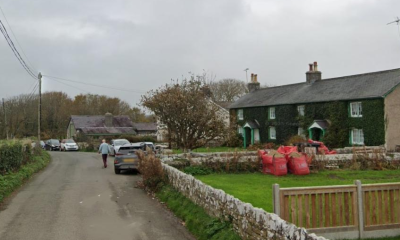News
AM highlights pancreatic cancer symptoms


Angela Burns AM: Supporting Pancreatic Cancer UK’s drive to improve care
ANGELA BURNS AM is encouraging people in Carmarthen West and South Pembrokeshire to know the symptoms of pancreatic cancer, and is supporting a charity’s drive to improve the care of local people with the disease.
Angela recently attended Pancreatic Cancer UK’s parliamentary event at the Senedd, when the charity launched its Patient Charter, which informs pancreatic cancer patients about the level of care they are entitled to in Wales.
Following on from a ComRes survey commissioned by Pancreatic Cancer UK which found that three quarters of people in Wales could not name a single symptom of pancreatic cancer, Angela Burns AM is joining the charity in its efforts to spread the word about the warning signs of the disease.
The symptoms include tummy pain that can spread to the back, significant and unexplained weight loss, yellow skin or eyes or itchy skin (jaundice), oily floating poo and indigestion.
Angela Burns AM is joining the charity in encouraging local people to find out more about the disease by taking part in its new symptoms quiz at www.pancreaticcancer.org.uk/ symptomsquiz and to share it on social media.
Angela Burns AM said: “Pancreatic cancer is a disease which sadly affects many people in my constituency.
“But our challenge is not just to improve awareness of this disease. It is also extremely important that we work towards every patient in Carmarthen West and South Pembrokeshire receiving the best care and support possible, and the Patient Charter is a big step in the right direction to doing that.”
Education
School in lockdown after reported phone threat

DYFED POWYS POLICE are dealing with an incident at a secondary school after a threat was reportedly made by telephone.
Officers were called to Maesydderwen Comprehensive School in Ystradgynlais on Monday (Mar 2), where the school implemented its lockdown procedure as a precaution to prioritise safety.
A police spokesperson said officers are working with the school following the report and parents have been informed through the school messaging app.
Police confirmed there are no reports of anyone injured and that all pupils and staff on site are safe and secure.
Officers remain at the scene and further information will be shared when available.
Finance
House prices rise 1% annually but experts warn Iran crisis could hit market

HOUSE prices across the UK increased by one per cent over the past year, according to the latest figures from Nationwide, but experts have warned that global tensions could quickly undermine the fragile recovery.
The building society’s House Price Index showed prices rose by 0.3% month-on-month, with the average UK property now costing £273,176, up from £270,873 in January.
Nationwide said the figures suggested a modest recovery following uncertainty towards the end of 2025, with improved affordability and easier access to credit supporting buyer activity.
Robert Gardner, Nationwide’s Chief Economist said: “This reinforces the view of a modest recovery after a dip at the end of 2025, most likely reflecting uncertainty around potential property tax changes ahead of the Budget.”
He added that housing market transactions during 2025 were ten per cent higher than in 2024, with first-time buyer mortgage completions up 18% year-on-year and home mover activity rising 15%.
However, property experts warned that geopolitical developments, including recent US strikes on Iran, could disrupt progress if oil prices rise sharply.
Babek Ismayil, CEO of homebuying platform OneDome said events in the Middle East could prove inflationary and delay anticipated interest rate cuts.
“It’s currently a very fluid situation,” he said.
Mortgage advisers also warned that rising inflation could push borrowing costs higher again.
Shaun Sturgess, director of Swansea-based Sturgess Mortgage Solutions said: “The recovery in the property market could be derailed quite quickly if oil prices continue to rise sharply.”
He added that expectations inflation would soon return to target were now under threat, potentially delaying Bank of England rate cuts.
Andrew Montlake, CEO at Coreco, said markets had been pricing in reductions this year but that outlook had changed.
“The UK economy and property market, which so desperately needs a rate cut or two, may now have to wait longer,” he said.
Experts said mortgage brokers would be closely monitoring financial markets in the coming days, particularly swap rates, which influence fixed mortgage pricing.
Despite the uncertainty, some advisers noted shifts within the market, with first-time buyers increasingly targeting larger homes while landlords purchase flats at reduced prices.
Health
Welsh Labour launches Senedd campaign with £4bn hospital pledge

WELSH LABOUR leader Eluned Morgan has launched her party’s Senedd election campaign with a headline pledge to invest £4bn in new hospitals, as the party faces growing political competition ahead of the May vote.
Speaking to party members and candidates in Newport on Monday (Mar 2), Morgan set out five central pledges focused on the cost of living, jobs, the NHS, the environment, and social fairness, presenting what she described as a long-term plan for Wales.
The announcement comes at a politically sensitive time, with health services widely expected to be a defining issue in the election and opposition parties seeking to capitalise on public dissatisfaction with NHS waiting times and performance.
Major NHS investment promise
At the centre of Labour’s campaign is a proposed £4bn Hospitals for the Future Fund, which would modernise parts of Wales’ ageing NHS estate over the next decade.
The funding would include replacing the University Hospital of Wales in Cardiff, redeveloping Wrexham Maelor Hospital, and supporting a new hospital development in West Wales.
Eluned Morgan said: “The NHS is not just a service. It’s a promise. And we need to renew that promise. Not with slogans, but with the biggest investment programme in our history.”
She said the programme would ensure hospitals were “fit for modern medicine” while improving working conditions for staff and patient access.
Mental health and access reforms
Alongside capital investment, Labour also announced plans to expand same-day mental health services across Wales through an “open access” model, building on the NHS 111 press 2 system.
Demonstrator projects would be rolled out across all health boards, with the Welsh Government claiming Wales could become the first country to offer such a model nationwide.
Five campaign pledges
Morgan outlined five key priorities:
• Tackling the cost of living, including a £2 bus fare cap and expanded childcare
• Jobs for the future through renewable energy and retraining guarantees
• A new NHS deal including hospital investment and women’s health initiatives
• Environmental protection including river clean-ups and tackling fly-tipping
• A fairer society with homelessness action, pay rises for low-paid workers, and improved schools
Political dividing lines
The Labour leader used her speech to draw sharp contrasts with rival parties, criticising Reform UK as offering “rage” without solutions and accusing Plaid Cymru of lacking detail behind policy proposals.
“We are seeing a politics that is louder than it is wise,” she said. “Plaid always has a complaint. Welsh Labour has the plan.”
Election context
Labour has governed Wales since devolution began in 1999, but the upcoming election is widely expected to be more competitive than previous contests, with polling suggesting a fragmented political landscape and growing support for challenger parties.
Health services, cost-of-living pressures and economic confidence are expected to dominate the campaign in the coming months.
Further policy announcements are expected in the weeks ahead.
-

 News6 days ago
News6 days agoLabour and Plaid criticised over £1.2m anti-racism ‘metaverse’ project
-

 Charity7 days ago
Charity7 days agoCharity launches bid to save Foley House with new community cooperative
-

 Health6 days ago
Health6 days agoHealth services row escalates as MSs demand action over Withybush and Bronglais
-

 Crime7 days ago
Crime7 days agoMotorbike thefts linked to Facebook Marketplace spark police warning
-

 Politics6 days ago
Politics6 days agoFarage vows to strip Cardiff’s ‘City of Sanctuary’ status ahead of manifesto launch
-

 Health5 days ago
Health5 days agoPetition calling for Withybush intervention nears 5,000 signatures
-

 News5 days ago
News5 days agoWelsh Government criticised after Russian-linked drone image used in defence announcement
-

 Business6 days ago
Business6 days agoBosherston Bistro 10pm alcohol licence granted by council


























